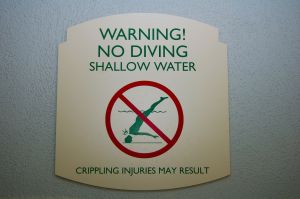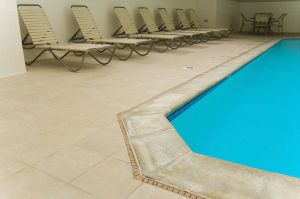
In Kentucky swimming pool accidents can be the responsibility of the owners of the property. The area of Kentucky law that deals with these types of injuries related to swimming pools are premise liability laws. Whether the pool is part of an individual homeowner’s property or at a setting such as a school, park, neighborhood pool area, hotel, or resort, the property owner has a legal duty to maintain safety and health standards at the pool. Premises liability laws, including those pertaining to injuries involving swimming pools, considers who is at fault and why.
Liability examinations boil down to looking at what caused the accident, what did the owner do or should have done related to preventing the accident, and what was the status the person injured. The status of the person injured will affect what duty the owner has towards that injured party. In Kentucky a person’s status upon a property is broken down into three categories:
• Invitee: Someone who the property owner allowed onto the premises for social reasons, such as a guest invited to a pool party at a private residence, or the guests of a hotel using the pool there;
• Licensee: A person who was allowed on the property for reasons of business; for example, a swimming pool serviceman or a utility company technician;
• Trespasser: A person who was not given permission to enter the property where the swimming pool is located. For instance, if the injured person jumped over two high fences and broke a gate’s lock to get into the pool and was then injured, he or she will be found to have some or all of the liability for the accident.
The degree of the duty owed by the property owner to the person injured upon the property varies based upon the status. A trespasser status, for adults, will require the lowest form of duty owed by the property owner.
In Kentucky, young children, even if determined to be a trespasser, will likely not be liable for their own injuries in a swimming pool. This is because Kentucky law will consider the swimming pool an attractive nuisance to the young child, and thus considered to have lured the child to it, even if wrongfully entering the property to get to the pool.
Continue reading →
 Six year old Ron-deja Lynn Stevenson was pronounced dead Tuesday at Kosair Childrens Hospital in Louisville, Kentucky after being found Saturday at the bottom of the Holiday Inn Lakeview swimming pool. The cause of death has been determined to be complications from a near drowning. The child had been found in the pool by another child around 10:15 p.m. and was rescued from the bottom of the pool by a man whom was informed that the girl was at the bottom of the pool. The child was given CPR at the scene and transported to Clark Memorial Hospital, stabilized, and then transferred to Kosair Hospital for further treatment. The child however never regained consciousness.
Six year old Ron-deja Lynn Stevenson was pronounced dead Tuesday at Kosair Childrens Hospital in Louisville, Kentucky after being found Saturday at the bottom of the Holiday Inn Lakeview swimming pool. The cause of death has been determined to be complications from a near drowning. The child had been found in the pool by another child around 10:15 p.m. and was rescued from the bottom of the pool by a man whom was informed that the girl was at the bottom of the pool. The child was given CPR at the scene and transported to Clark Memorial Hospital, stabilized, and then transferred to Kosair Hospital for further treatment. The child however never regained consciousness. Kentucky Personal Injury Attorney Blog
Kentucky Personal Injury Attorney Blog


